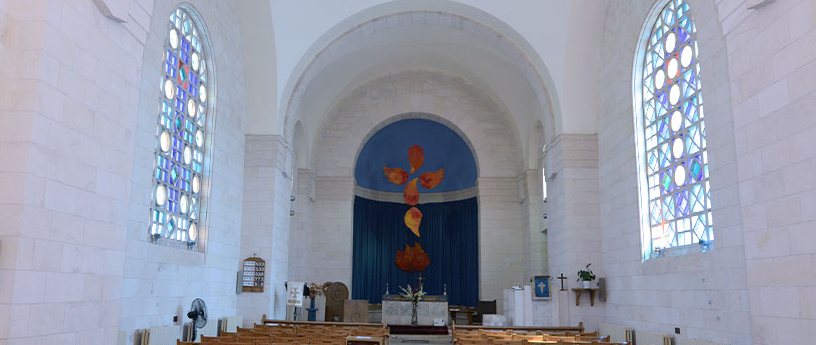15th after Pentecost, September 6 2015
Proverbs 22.1-9, 22-23;; James 2.1-17; Mark 7.24-37
Rev Páraic Réamonn, Church of Scotland
Last Tuesday, Tabeetha School in Jaffa opened for the first day of the new school year. On Wednesday it closed again. Those of you who’ve been following the Israeli media more closely than most will know why.
*
Tabeetha School was founded in 1863 by Jane Walker-Arnott, the eldest daughter of a Glasgow University professor. She felt called to educate the local Arab community, Christian and Muslim, in what was then a somewhat rundown port in a declining Ottoman empire. She felt called especially to educate Arab girls, to give them dignity and a degree of independence in an oppressive society. When she died in 1911, she made a gift of the school to a surprised Church of Scotland, and we have run it ever since.
Tabeetha is an open, ecumenical, interfaith and international school. From the beginning, its pupils included Christians, Muslims and Jews. But today, a key purpose is still to serve the Arab community, above all the Arab Christian community.
Christian schools are under pressure in Israel today. The state of Israel has signed and ratified the UN convention against discrimination in education, but for years Christian schools have not been treated equally. Two networks of ultra-Orthodox schools receive full funding from the state. By contrast, a decade ago Christian schools received two-thirds funding, with the balance of their budgets coming from tuition fees and other contributions. By 2013, that had been cut to only one-third; and meanwhile, the state has been trying to limit the amounts that Christian school can raise through tuition fees and other means.
This double whammy is a death warrant for our schools.
Sometimes, the mute need to speak. We are called to be slow to anger, as God is; but sometimes, we need to stand up and say we’re not going to take it anymore.
*
Despite a personal intervention by the Israeli president, Reuven Rivlin, so far the ministry of education has shown no sign of a real willingness to redress the plight of Christian schools created by its own persistent policies of inequality. And so, at the end of August, the schools decided to strike, and Tabeetha decided to strike with them.
The UN convention is quite clear. States that ratify the convention commit themselves to abolish any statutory provisions or administrative instructions and to end any administrative practices that discriminate in education. The state of Israel has yet to do this.
But the question cuts deeper than secular democracy, as we will see at the end.
*
All three of our readings this morning touch in their different ways on discrimination, equality, favouritism and partiality.
The book of Proverbs seems to have been compiled by wisdom writers from the urban elite for the urban elite. Today’s reading is focused on how the rich are to treat the poor but, as often with compiled texts, is not entirely consistent.
Verse 4 has a sulphurous whiff of the prosperity gospel: The reward for humility and fear of the Lord is riches and honour and life. Go to church and get rich quick. As someone who has been going to church for years, I have to tell you this doesn’t work.
But reality breaks in three verses later: The rich rule over the poor, and the borrower is the slave of the lender. Inequality of this kind leads to its own destruction, a point that many of our western societies need to take to heart.
So our reading advises the wealthy to value a good reputation more than silver or gold. It reminds them that those who show generosity in sharing their bread with the poor are blessed.
In words that echo the prophetic tradition, it ends by cautioning the rich not to rob the poor and, in particular, not to manipulate the legal system against them. Do that, it warns, and the Lord God will act as a lawyer in their defence, and it will all end in tears.
Rich and poor are fundamentally equal. Rich and poor alike are made by God in the image of God. We share a common humanity.
These points are echoed in that most Jewish of New Testament writings, the letter of James. Suck up to the rich but pat the poor condescendingly on the head, while refusing to do anything for them, and you show by your partiality and favouritism that in truth you don’t really believe in God or the Lord Jesus Christ.
Think of how the European Union has treated the suffering people of Greece.
*
We are all God’s children, and all of us are good at forgetting that. Wealth is just one of the markers we can use to divide the world into us and them. Christians can be hostile to Muslim and Jewish others, and throughout our history we often have been. And narrow nationalism is never out of season.
In one of Bob Dylan’s most famous songs, he sings that the land that he lives in has God on its side. Dylan, of course, doesn’t believe what he sings. His whole song is a rejection of any such religiously grounded nationalism. But many people in many lands down through the years have succumbed to this destructive belief, with the consequences we know.
I make these uncontroversial remarks as a lead in to the last question I want to raise: was Jesus a racist?
A lot of bad commentary on today’s gospel suggests that he was, and that the Syrophoenician woman had to put him straight.
There are two obvious problems with this: doctrine and history.
Few sins are worse than the sin of racism. The letter to the Hebrews tell us that Jesus is as human as we are and has in every respect been tested as we are but yet is without sin.
In any case, it is historically implausible that when Jesus tells the woman that it is not fair to take the children’s food and throw it to the dogs, he is speaking in his own voice. If we know anything at all about the Jesus of history, it is that he was not a narrow nationalist.
Let’s look at Mark’s story again.
*
The woman tears up the Mediterranean rule book. A woman, and a gentile woman at that, unrelated and unknown to Jesus, she invades his privacy, bursts unannounced into the house where he is staying, and demands a favour. Why does she behave so outrageously? Her little daughter is ill, and she is desperate. She is like a pregnant woman at a checkpoint pleading with a soldier to let her through so that she may give birth.
The response of Jesus is to raise the stakes.
Jews in his day were sharply aware of their status as God’s people. For many, centuries of being hated, persecuted, overrun, sneered at and ill-treated by the rest of the world had hardened this awareness into a solid wall, a separation barrier, with Jews on the one side and everyone else on the other.
Jesus reminds the woman of this view, not uncommon among his contemporaries: we are God’s children, you are dogs. Why should I, a Jew, help you, a gentile?
And the woman tells him why.
In love and desperation, she doesn’t challenge the terms of his argument; she turns it against him. “Sir (a term of respect), even the dogs under the table eat the children’s crumbs.”
These dogs are not today’s family pets. They are the dogs of the ancient Mediterranean. They are not the cocker spaniels of King Charles or the corgis of Queen Elizabeth. They are wild dogs, feral dogs, who have come in from the street, just as she has. There is, it seems, nothing she will not stoop to do or say to get Jesus to help her daughter.
And Jesus does that.
We should, I think, imagine him smiling inwardly as he compliments the woman on her reply and tells her that her daughter is already well.
*
We should also avoid the temptation to fall into an old and fatal trap: to use this story to contrast Christian univeralism with Jewish particularism.
Jesus is a Jew. As a Jew, he resists a particularist reading of his tradition, just as we should resist a particularist reading of ours.
Christians and Jews alike can erect a Chinese wall between us and the others, but this is to misunderstand ourselves badly. Christians and Jews alike look back a common beginning in the story of Abraham, who is called by God so that the people who trace their origin to him may be a blessing to all the peoples of the earth. Christians and Jews exist, not over against the others, but for their sake.
And that, most fundamentally, is why Christian schools strike against discrimination in Israeli education. It is not just that as Christians we want to discourage that sort of thing. It is that Israel, as a Jewish state, should not discriminate. It should be a state of all its citizens.
God shows no partiality, and neither should we.
We are called to be impartial, as God is impartial. We are called to be just, as God is just. And we are called to be generous, as God is generous.

